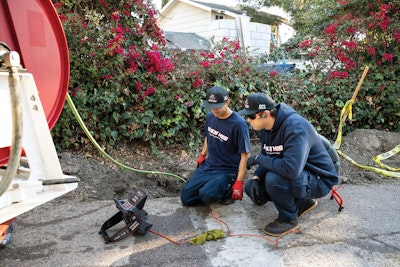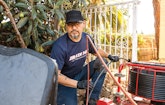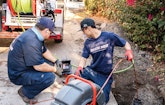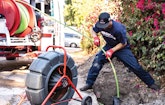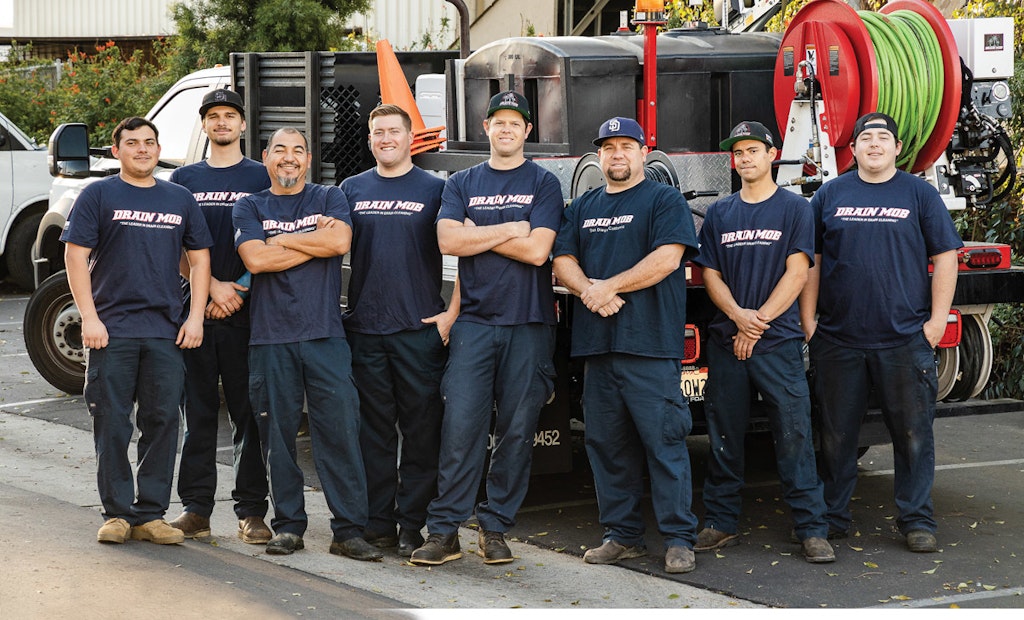
The San Diego-based Drain Mob crew includes (from left) Eddie Zamudio, Andrew Castle, Ruben Zamudio, Cody Worbington, Jacob Kemble, Billy Teeter, Joey Flores and Ryan Cascante.
Interested in Cleaning?
Get Cleaning articles, news and videos right in your inbox! Sign up now.
Cleaning + Get Alerts"Drain Mob” might conjure up images of menacing thugs straight out of The Godfather. But the San Diego, California-based Drain Mob is a different kind of crew.
The company focuses primarily on drain work. “We have a plumbing license, but we don’t do plumbing except for repairing underground lines. We don’t do gas lines or water heaters or faucets,” says co-owner Billy Teeter. One of two addresses to the company’s website is a no-nonsense www.wedodrains.com.
The “Mob” part of the name is intended to convey that the company is there to protect vulnerable customers from sweet-talking service reps who show up at their door. The Mob is there to push back.
“I came up with the name at the old company,” Teeter says. “Some of us always called ourselves ‘the drain mob’ to set us apart from the plumbers out there who are geared toward sales. I’m not out to badmouth anybody, but we all see too many guys who go out to sell, sell, sell. They take advantage of homeowners. We want to take care of people, to protect them.”
This is not to suggest Drain Mob isn’t interested in selling its services. The company simply draws the line at “overselling customers something they don’t need.”
Teeter picked up this philosophy at Affordable Drain Service in San Diego, where he worked for a total of 15 years starting at age 20. “It is a great company, an awesome company. I owe them a lot. The best drain cleaning guys in this area came from that company. Craig Post gave us all a great opportunity and taught us a great trade.”
Moving on
When he decided to start his own drain cleaning business in June 2017, he brought on a partner, his neighbor Jacob Kemble. “Jacob moved in next door in 2014 and we became friends. He knew I was going to start my own company. I knew him pretty well and knew he would be a good fit. I didn’t want to do everything myself and I knew I could trust him.”
Kemble was working at an insurance company, putting to use his bachelor’s degree in business administration from California State University San Marcos. He had previously worked in construction before the market crashed in 2007-08.
“I was just tired of working for corporations and all that goes along with that,” Kemble says. “I knew Billy was a great guy and a hard, hard worker. He’s hard to keep up with. I admired his work ethic and skill set. It was the right fit for me.”
Teeter says he quit his job at Affordable Drain Service one day and started Drain Mob the next. Kemble came on board the following month. For the first year, they worked out of Kemble’s garage where Kemble answered phones and worked up invoices. Before long, Teeter took his partner on service calls, too.
“It is unbelievable how quickly he learns,” Teeter says. “He isn’t scared to get his hands dirty and to learn new stuff. He quickly found his niche.”
So did the company, and business boomed. Teeter hired his first employee within six months of launching the company. Kemble says it grew almost faster than they could keep up with. Teeter’s network of old customers and people in the industry coupled with his outgoing personality channeled business his way. “I knew it would work,” he says matter-of-factly.
Making adjustments
The company’s service area ranges across the entire San Diego County area, including dozens of communities on the coast and inland from Bonita to Rancho Santa Fe to University City. It is a congested area, to say the least — which, of course, means lots of potential customers, though getting to them can be challenging on a bad traffic day.
“The traffic morning and afternoon is so brutal,” Kemble says. That was one silver lining of the COVID-19 pandemic: People staying at home reduced traffic jams for people like Drain Mob technicians who still had to go to work. “It’s helped us from 4 to 6 in the afternoon. It used to take us 45 minutes to go 15 miles. Now we can go 10 miles in 15 minutes. We haven’t had hard traffic since spring.”
The impact of the virus on the company has otherwise been mixed. People are home more hours a day “using their facilities,” as Teeter says, so more residential drain problems have cropped up for Drain Mob to address. On the other hand, some restaurant customers have closed and others are struggling. The company’s response has been compassionate.
“We try to help out small, family-owned businesses,” Teeter says. “If our guys get a slow day, we’ll send them over to a restaurant to cable out their key drains. They appreciate it. They stuck with us and now they’re going through a hard time.”
The owners have spent thousands of dollars on personal protection equipment for their service techs and office employees, according to Teeter. “We ordered so many masks, spent ridiculous amounts of money for PPE, 10 times the price we would have paid later; but we didn’t know how long it was going to go on and we wanted to protect the guys out there.”
Teeter and Kemble laid off some of their office staff when the virus first struck but have since rehired them. The first week was “kind of weird,” Teeter says, but business activity has stabilized, with a greater proportion of residential customers, and additional help has been brought on to keep up with service calls.
Trying new methods
A perk of drain work in San Diego is that most homes don’t have basements and the generally warm climate allows for sewer lines to be laid relatively close to the surface. All of that means accessing and working on clogged drains is easier and faster than in areas of the country where basements are the norm. Generally, the drains are old stock — many dating from the 1950s but some going back to the late 19th century.
Drain Mob has a variety of tools that techs carry to remedy a customer’s complaint. Spartan 300 cable machines are used to clear mainlines, with DCD Valor drum machines rolled out for 1 1/2- to 2-inch lines. A Milwaukee M12 cordless drill machine is employed for bathroom tubs, showers and sinks.
“We also keep it old school sometimes,” Teeter says, “using an Erickson hand-crank cleaning machine with a drophead cable for the difficult bathtubs.”
To jet a line, the company calls on US Jetting equipment — four of the jetters are trailer-mounted, one rides in a truck. To inspect lines before and after, Drain Mob depends on a variety of RIDGID cameras.
Those were the services offered by the company when it started in 2017. Jetting remains its most in-demand service, but Teeter credits Picote specialty equipment with dramatically boosting business. The company calls on Picote Maxi Millers, Mini Millers, a Super Midi and a minicleaner for drain cleaning. Tech Reuben Zamudio has a box truck full of Picote equipment and solely devotes himself to grinding out old liners, descaling and otherwise restoring lines rather than replacing them.
“Picote loves Reuben,” Teeter says. “He uses their equipment more than anyone else I know in the U.S.” Teeter travels often to the new Picote facility in Arizona to check out new equipment.
The company does smoke testing and recently began pipe lining — specifically, the process from American Pipelining Supplies, which involves pneumatically propelling a nontoxic solution through corroded pipes, breaking down and removing the corrosion and following up with a potable water-safe epoxy that’s flowed into place and cured.
Another APS product — the Versapatch — is getting a workout at Drain Mob. Versapatch is designed for spot repairs less than 6 feet in length. It can be inserted up to 100 feet into a pipe and affixed to a pipe’s walls.
Kemble has taken a particular interest in the lining projects. “I like new equipment and new methods of doing things. A lot of guys know about the patch but prefer traditional ways to repairing pipe. I decided, let’s see what we can do with this.”
In general, Teeter advocates for putting quality above price in selecting tools. “You buy the good stuff one time instead of going with cheap stuff and replacing it. It can cost more money, sure, but that’s the way to go. Picote is a game-changer for anyone who will invest in it.”
The right balance
The crew of techs generally is cross-trained, with new hires riding along with veteran techs for up to six months to learn what is expected of a member of the Drain Mob — that is, protecting customers rather than pressuring them, and doing it skillfully. Also, crew members benefit from Teeter’s aversion to working too many hours.
“I was burned out so bad before, I want to make it comfortable for my guys. We answer calls five days a week, 7 a.m. to 7 p.m., and don’t work Sundays,” he says. “If someone wants to, they can work Saturdays. We get calls at night but usually refer them to Affordable Drain Service. There is so much work out there.”
The co-owners appear to be a good team. Kemble calls Teeter “the best drain guy in San Diego” and one who is a problem-solver. “Billy likes the tough jobs. He likes a good challenge.” For his part, Teeter praises his partner’s superior communication skills. “Jacob is the nice guy. When guys have a problem, they call him. I am hard on people sometimes. I take it so seriously, trying to get everything just right.”
Together, the Drain Mob team sees continued success in their business venture, partly because they are willing to change with the times as new drain cleaning products appear. “We are open to evolving with the industry,” Kemble says, which could mean eventually opening satellite offices or other expansion possibilities. “If we find the right person, we might open an office in another city. But it will have to be the right person for the Mob. He will have to have the same mindset as us.”
No gimmicks, no bull
How does a new drain cleaning company draw attention to itself as it works to establish its share of the market? One seemingly counterintuitive idea is to work incognito.
The San Diego-based Drain Mob does exactly that, at least sometimes. About 20% of the company’s jobs involve work for plumbers who don’t have the necessary drain equipment.
The four-year-old company lets the work speak for itself when a crew is on a site as a subcontractor. Technicians arrive in plain, unmarked white vans or box trucks. “We don’t brand them, so when we show up, we represent the contractor instead of ourselves,” says co-owner Billy Teeter. “We will even change our shirts and put on RIDGID or Milwaukee shirts instead.”
For jobs on which they’re the primary contractor, techs wear Drain Mob or www.wedodrains.com T-shirts, but the trucks still are unbranded and no gimmicky uniforms are in evidence. “We come to do the work, to clear the drain and get the hell out of there,” Teeter says.
Even though not all of Drain Mob’s work is subcontracting, that professional courtesy is important. The plumbers who hire them appreciate it and it earns them repeat business.
The blank work vehicles aren’t a problem when it comes to drumming up other work. Relying pretty much on Yelp reviews, Instagram videos — Teeter enjoys some celebrity status there for his videos and his “blub, blub, blub” catchphrase when he shows a drain running clean post-job — and, most important, word-of-mouth recommendations, the company is growing steadily.
Teeter has a straightforward explanation for why Drain Mob is successful and it has nothing to do with advertising or branding. “Why do they come to Drain Mob? Because there’s no bull. We’ll take care of them. Seriously.”
